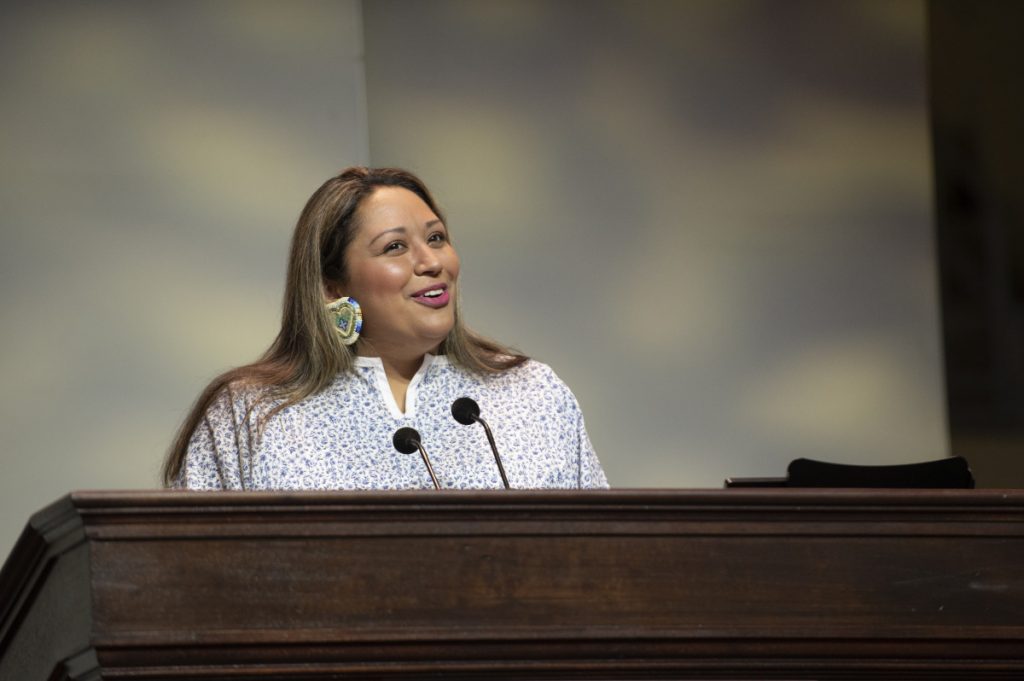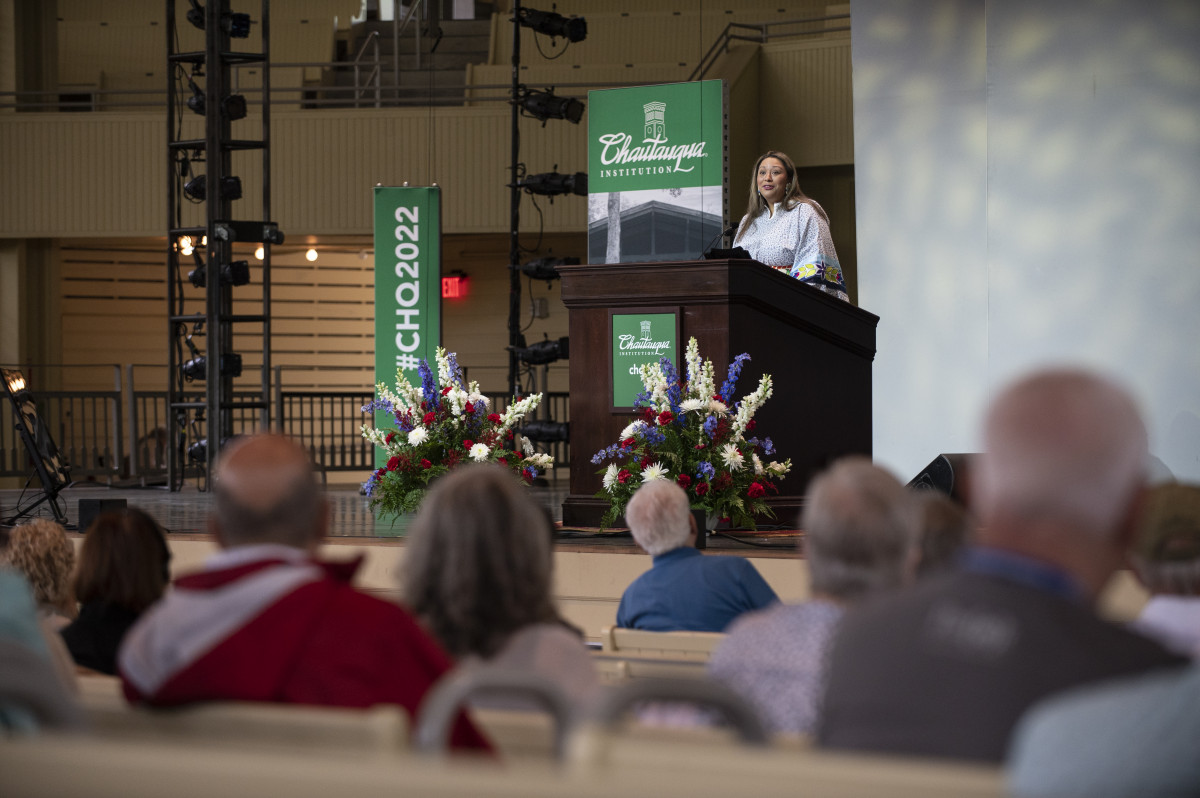Earth has never been uninhabited. There has always been an organism, plant or water droplet roaming the planet. Kelsey Leonard, Canada Research Chair of Indigenous Waters, Climate and Sustainability at the University of Waterloo, works to bring justice – from the droplets to the oceans – to Indigenous waters.
Leonard gave her lecture at 10:45 a.m. Wednesday, July 6, in the Amphitheater, continuing Week Two of the Chautauqua Lecture Series theme of “The Wild: Reconnecting with Our Natural World.”
Leonard said at its heart the current climate crisis has become a human crisis, and the idea that people are separate from nature is a misconception driven by their desire to forget their own responsibility to the planet.
“When we put forward this myth that the natural world is creating the scarcity, we forget our responsibility (and) our culpability in creating this destruction,” Leonard said.

The decision of West Virginia v. Environmental Protection Agency has been a discussion among multiple speakers this week, both in the CLS and Interfaith Lecture Series. Former U.S. Rep. Bob Inglis spoke Monday morning and raised a similar concern about this case for the United States.
“I also took away another perspective from the ruling: … that we can no longer sit idly by and assume that our experts or our agencies will solve the problems that we’ve created and continue to exacerbate,” Leonard said. “We must act. We have a responsibility to act.”
To prove her point that this has become a human crisis, Leonard asked the audience to raise their hand if they had a child, niece or nephew, grandchild or great-grandchild born in 2022. About half of the audience raised their hand.
“When I read the court’s opinion, this line stood out to me: ‘If the current rate of emissions continues, children born this year could live to see parts of the Eastern seaboard swallowed by the ocean,’ ” Leonard said.
Earth’s current path includes the loss of 68% of animal populations in the last 50 years, Leonard said. More than two-thirds of the longest rivers no longer flow freely, and nearly half of the coral reefs have disappeared in the last 30 years.
“This is not planetary extinction,” Leonard said. “This is human extinction, being driven by humans, by each and every one of us.”
As a citizen of the Shinnecock Indian Nation in Long Island, New York, Leonard has seen firsthand the economic and environmental consequences of humans not taking care of the planet.
Leonard said she was fortunate to hear Faithkeeper of the Turtle Clan, part of the Haudenosaunee people, Oren Lyons speak Tuesday afternoon for the Interfaith Lecture Series advocating for climate change reform.
Earth Law, often referred to as “ecocentric law,” is an emerging body of law for protecting, restoring and stabilizing the interdependency of Earth’s habitats. It allows Earth to operate naturally. Leonard is the director of water advocacy for Earth Law Center.
“I believe that Earth Law might actually present an opportunity through the rights of nature for us to democratize our environmental governance,” Leonard said. “We need those who are directly impacted by climate change to be making the decisions about how we mitigate and adapt.”
This led Leonard to ask who the guardians of the Earth and its environment should be. She suggests bringing in advocates who aren’t experts in the field, but who experience the repercussions of climate change in their daily lives.”
“What’s the worst that could happen if you give others the opportunity to make these decisions? We’re not doing so good right now,” Leonard said. “Ultimately, it’s about changing our oversight. It’s about making decisions in the best interest of nature.”
Leonard said in order for nature to thrive, people need to acknowledge it also has rights.
“Nature has rights to exist, thrive and naturally evolve, but it also imbues on us, as humans, obligations to act differently,” Leonard said. “It is also a process by which we start to transform our relationship to nature. We have to think of ourselves not as property owners, but as stewards, as individuals and communities and societies with a responsibility to nature.”
Popular travel destinations, such as Myrtle Beach, Miami Beach and Virginia Beach, are regularly cleaned and cared for, Leonard said. The other “not so pretty” bodies of water need to be cared for too, she said.
“We’re all kind of gambling right now that these natural entities will be around for (us), let alone for when those children (who were born this year) need them,” Leonard said.
Many Indigenous grandmothers have asked Leonard the question: “What are you going to do about it?”
Leonard said finding the inspiration to act on this human crisis can be hard, but she encouraged the audience to think of the people who will come after them.
“Each of you has someone you care about who will inherit the care you showed — or did not show — to this planet,” Leonard said.
Leonard said the next step is promoting legal change. The Powerpoint that accompanied her lecture overhead in the Amp gave four approaches: Go for constitutional amendments, start somewhere, appeal directly to judges and create replicable models.
She also encouraged the audience to use talents that may not seem correlated to climate action or legislature.
“Many of you have different gifts; you’re artists or poets or lawyers …” Leonard said. “Hopefully from today’s conversation, you realize you’re not alone.”
Leonard spoke about the stories she’s heard from Chautauquans while being here, and said lake health should be just as important to them as anyone else, given the generations of families born and raised in Chautauqua.
She said Chautauqua Lake is threatened by persistent development, the deteriorating sanitation infrastructure of homes around the lake, and the lack of natural habitat and shore restoration.
“This is an example of how we prioritize human needs above the needs of the lake,” Leonard said. “Grass may be a nuisance for your boats, but it’s critical for lake health.”
Acknowledging that everyone may not be a grassroots activist, Leonard said people need to take charge as citizens for local Earth Laws.
“When we do this, we’re creating a future that is liveable for those generations to come,” Leonard said.
She closed her lecture by urging her audience to form the same relationship with nature they have with the grounds of Chautauqua.
“Ultimately, the task is up to us,” Leonard said. “The climate crisis is a human crisis, but it also can be a crisis in which we respond not with fear or anxiety, but with love.”





